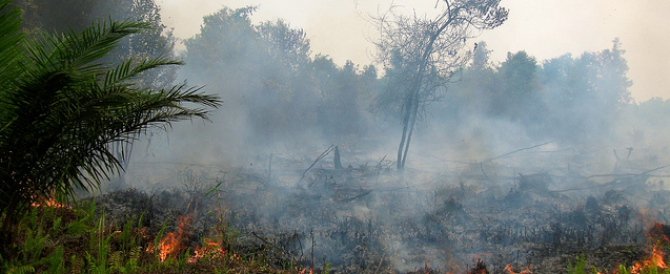A wave of fire is sweeping across Indonesia’s forests, blanketing parts of Indonesia, Singapore and Malaysia in toxic smog. Each year as the haze sets in these three countries debate who is to blame and how this can be stopped. This ritual round of finger pointing diverts from one critical factor – that these countries are sharing not only the effects of the fires, but also their profits.
Indonesia’s forest fires are fuelled by seasonally dry conditions, but are often caused by companies setting forests alight as a cheap way to clear them for oil palms and timber plantations. Implicated companies are based across Indonesia, Singapore and Malaysia. The billions of dollars pumped into the expansion of their operations come largely from big domestic banks that bankroll the sector, along with a handful of international ones.
Clearing forests with fire is illegal. It also accelerates climate change in two ways – blazing trees and their peat soil release carbon dioxide into the atmosphere and dead forests cannot absorb any more.
Local populations are burned off their land and the resulting smog is deadly for the urban populations that are engulfed by it often hundreds of miles away.

The research group World Resources Institute this week identified nearly a hundred separate fires using real-time satellite imagery. This shows how the vast majority have occurred in the concession areas of two major companies: Singaporean-based Wilmar and the Singaporean-Indonesian Sinar Mas / APP group. Both are giants in the palm oil and pulp and paper sectors, and both recently announced pledges to halt deforestation, to equal measures of applause and scepticism.
Not only are these domestic companies, they are also heavily backed by home-grown banks – loaned hundreds of millions of dollars by at least eight major banks from Indonesia, Malaysia and Singapore[1]. These banks have collectively lent more than US $8.6 billion to the logging, pulp and paper and palm oil sector over the past three years. Rising global demand for wood, paper and palm oil translates into healthy returns for the banks priming the system.
While debates over law enforcement flare up again, attention ought also to be paid to the finance that enables the expansion of operations that cause the fires in the first place. While it is illegal for companies to clear forest with fire, there are no sanctions preventing banks from funding and profiting from companies that might be responsible.
While millions of people across Asia choke this summer, it will be little comfort that the fires responsible are likely to make a handful of bankers very rich.
[1] CIMB (Malaysia), RHB Banking Group (Malaysia), OCBC (Singapore), DBS (Singapore), United Overseas Bank (Singapore), Bank Mandiri (Indonesia), Bank Rakyat Indonesia (Indonesia), Bank Negara Indonesia (Indonesia)